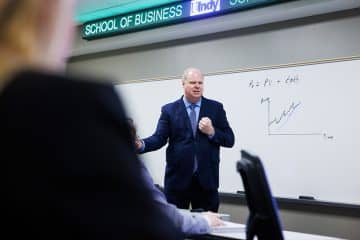What Is AACSB Accreditation, and Why Does It Matter?
Pursuing an MBA requires a huge investment of both your time and money, but for good reason! The skills you will gain and the connections you will make are sure to pave the way for higher earnings and greater overall outcomes. As you search for schools to apply to, it’s important to see whether they are accredited by verified accrediting bodies. Accreditation is the official quality assurance check that indicates that a school’s curriculum meets the industry standard. Without accreditation, employers and other institutions can’t truly know whether someone with a degree actually received a high-quality education.
MBAs and other postgraduate degrees are constantly growing in demand as the job market gets more competitive and as distance-learning technologies make education more accessible for working adults. And, sadly, wherever there is money to spend, there are scammers to look out for. While many great colleges and universities offer high-quality online MBAs, many for-profit modules and fake accreditors are offering fast tracks to ‘degrees’ that ultimately won’t be worth much during your job search.
Avoid paying for a fake degree—pursue your MBA at an institution that is accredited by AACSB so that you know your education will be valued by employers and valuable to your skills as a business leader.
What Is the AACSB?
The Association to Advance Collegiate Schools of Business (AACSB) is an internationally recognized nonprofit that independently reviews business curricula across the globe.
“Synonymous with the highest standards of excellence since 1916, AACSB provides quality assurance, business education intelligence, and learning and development services to over 1,700 member organizations and more than 900 accredited business schools worldwide.” – About AACSB
AACSB-accredited schools are among the strongest and most comprehensive institutions for higher learning in business. Holding a degree from any of these schools will make your experience unquestionable!
Is AACSB Accreditation Important?
Yes! Companies actively seek qualified graduates from AACSB-accredited schools over those from non-AACSB schools specifically because of the standards they know that the graduates have met. This credential stands so strongly on its own that applicants are given a second look.
Dr. Russ Jones, Dean of the Arkansas Tech University’s College of Business, also stresses this accreditation’s importance. “The AACSB is the ‘gold standard’ in accreditation for collegiate schools of business both in the United States and around the world,” he says. Businesses prioritize applicants with AACSB-accredited degrees “because of the high standards that the college must meet to receive the accreditation.”
But it’s not all about just getting a job. It is also a promise of lifelong learning that is valuable both to new and current employers. Some businesses offer to pay, at least partially, for some of the tuition and fees associated with their employees’ continuing education. If you are not choosing to attend an AACSB-accredited school, however, your chances of getting school paid for are slim.
How Does a School Become AACSB Accredited?
“Initially, a college of business requests permission to be a candidate for accreditation by the AACSB,” says Dr. Jones. “Data is collected and submitted from faculty, administration, and students over a period of time.” The college compiles the data and submits an in-depth report to AACSB, who then performs an on-site visit for a more in-depth look of the college in practice.
The AACSB accreditors investigate the schools’ administration and curriculum and make a recommendation to the organization’s accreditation committee. If the AACSB Board of Directors are satisfied with the accreditors’ report, they grant the accreditation.
The process doesn’t end there! Dr. Jones confirms that maintaining accreditation with AACSB is an ongoing point of focus that schools should have. “If accredited, the college will immediately begin a phase of continuous improvement because the accreditation must be reaffirmed every five years. Therefore, it is a continuous process.” It’s not enough to earn accreditation once; schools are expected to maintain their quality in order to hold onto this accolade.
What Resources Do the AACSB Provide?
AACSB’s recognized schools are part of a broader community of excellence, connecting students and alumni to other leaders from over 890 high-quality institutions. Members have insight into how other schools are handling curriculum development, research output, scholarships, salaries, entrance requirements, and more.
At a practical level, the assistance of AACSB in its accredited schools takes the form of sponsored conferences and seminars, course materials, and mentorships:
“When educational, professional, and business organizations become members of the AACSB Business Education Alliance, they are part of a movement united to improve the quality of business education around the world. AACSB connects, shares, and inspires innovation and quality throughout the member network, as well as the business community. The collective strength of the organization is founded on diverse perspectives, a global mindset, and a commitment to making a difference.” – About AACSB
What Should You Expect When Applying to an AACSB School?
Just as the schools have to meet a high standard in order to receive accreditation, so too do applicants need to meet a high standard and show their potential as dedicated, skilled students. For example, while some schools are shying away from requiring GMAT and/or GRE scores, it is still common practice for AACSB schools to require them. Expect to find more stringent application requirements, and make sure to review your application with a fine attention to detail.
Some colleges may also ask you to schedule an interview with an admissions representative so that you can speak about all that your written application may not have communicated. The admissions process can be rigorous, but it is all an attempt to see your ability to manage pressure and lead with confidence.
Making a Choice for Your MBA
Now that you understand the importance of verified accreditation, you’re ready to start your search! Beyond Dr. Jones’ home at Arkansas Tech University, take a look at a few examples of schools whose AACSB-accredited programming goes above and beyond to train powerful leaders.
- University of Louisville (Louisville, KY): The University of Louisville College of Business offers four MBA programs to suit the needs of every business professional. Designed to challenge and inspire, these programs combine practical knowledge with experiential learning. Its Full-Time, Professional, Executive, Entrepreneurship, Global, and Online MBAs are all designed to fulfill the university’s mission of creating thoughtful, reasonable leaders who strive to change their local and global communities for the better.
- Willamette University (Salem, OR): Willamette’s MBA for Professionals on-campus MBA program is designed to support and sustain working professionals with stretched time constraints. Classes are held bi-weekly, and students have full access to financial advising, career development services, and even catered meals the nights they meet for class. MBA candidates at Willamette learn from dedicated faculty who strive to support them and their work schedules, making the MBA for Professionals degree a great choice for even the busiest of adults.
- Illinois State University (Normal, IL): Illinois State creates a personal, supportive environment where MBA students can strive to become the best in their field. Classes are taught during the evening time in small class sizes to promote personal engagement with their diverse faculty. Students can choose between the traditional weeknight format and the accelerated corporate format, which are tailored to the schedules of working professionals.
- The University of Texas at Dallas (Richardson, TX): UT Dallas’ Naveen Jindal School of Management offers an MBA with fifteen different concentrations. And, with five different MBA formats from full-time to evening and self-paced schedules, all students of all professional backgrounds and interests are welcome to be a part of the community.
- University of Hartford (West Hartford, CT): Hartford’s flexible MBA program allows students to study part time or full time with in-class and online options available to fit their personal schedule. Hartford prepares students for management roles while having students work among a diverse range of organizations such as large corporations, not-for-profit organizations, and family-owned businesses.





